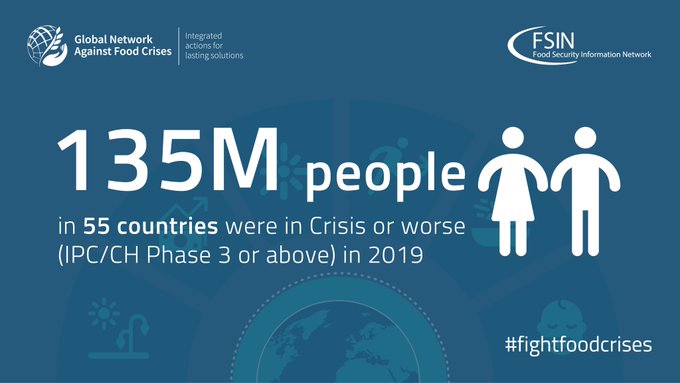Global Report on Food Crises and knock-on effects of COVID-19 in the hungriest countries
Discussion details
The Global Report on Food Crises (GRFC) 2020 is the result of a joint, consensus-based assessment of acute food insecurity situations around the world. It is the product of joint efforts of numerous humanitarian and development actors, who share data, analyses and expertise. The Report is a product of the Global Network against Food Crises, and it is facilitated by the Food Security Information Network (FSIN).
The 2020 Report finds that over 135 million people were acutely food insecure in 2019. This means they live in a situation of food crisis or worse (IPC/CH Phase 3 or above). This is the highest number found in the four years of the GRFC's existence – and it is also due to the larger-than-ever number of countries included in the Report. Over half of the acutely food insecure people live in Africa (73 million); 43 million live in the Middle East and Asia; 18.5 million live in Latin America and the Caribbean. Moreover, the Report finds that 75 million children were stunted (low height for age) and 17 million suffered from wasting (low weight for height) in 2019. The main drivers for acute food insecurity are conflict (which drove 77 million people into food crisis), extreme weather (34 million people) and economic turbulence (24 million).
On 21 April 2020, a virtual social media campaign was organised to announce the launch of the websites and of the 2020 Report. Different partners stated their commitment to respond to food crises worldwide, especially in light of the COVID-19 pandemic. On behalf of the European Union, Jutta Urpilainen, Commissioner for International Cooperation and Development, mentioned the EUR 20 billion global COVID response package announced on 8 April by the EU. Janez Lenarčič, Commissioner for Crisis Management, said "The global report can guide us in addressing the needs of the most vulnerable in terms of food security, nutrition and livelihoods".
The Report was later discussed during a s
The Report as well as its main findings and video statements are available at the Global Network's website and the Food Security Information Network (FSIN)'s platform.
For more information, please visit: https://europa.eu/capacity4dev/hunger-foodsecurity-nutrition/discussions/global-report-food-crises-and-knock-effects-covid-19-hungriest-countries
The 4th Global Reporton Food Crises gives consensual, evidenced-based information on food crises. The report and supporting messages and contents are made available via a digital campaign under the hashtag
Log in with your EU Login account to post or comment on the platform.